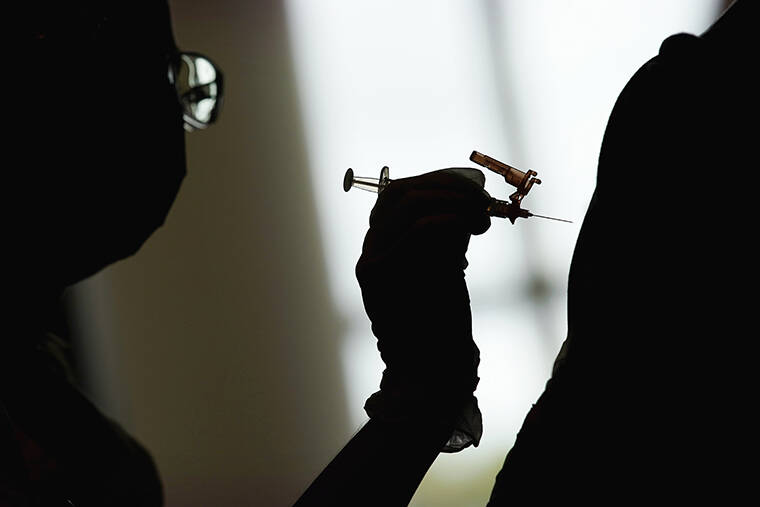
CHICAGO >> During the height of the pandemic, 4 in 10 Americans misled others about their COVID-19 status or their adherence to public health measures designed to prevent the spread of the virus, according to a study published today in JAMA Network Open, a journal of the Chicago-based American Medical Association.
Researchers found that about 42% of adults admitted they had engaged in some form of misrepresentation related to having COVID-19, vaccination or compliance with pandemic protocols. The results were based on a survey of more than 1,700 adults nationwide conducted in December 2021 — a time when coronavirus cases were surging across the country.
“These data point out to us that a strategy that relies on people admitting to having symptoms or the actual diagnosis may not be the best strategy in future pandemics,” said Angela Fagerlin, senior author of the study and the chair of the Department of Population Health Sciences at University of Utah Health. “The data suggest many people will be dishonest for a variety of different reasons.”
She added that researchers were a bit surprised by the level of reported misrepresentation “given the gravity of the situation.”
More than 6.5 million deaths worldwide and a little over a million in the United States have been attributed to the virus.
In the study, around 18% of those surveyed reported that at some point during the pandemic they thought or knew they had COVID-19 but failed to mention that to another individual they were with or about to be with in person. More than 24% reported telling an in-person contact that they were taking more COVID-19 precautions than they actually were.
About 20% of those polled did not mention having the virus or thinking they might have the virus when screened to enter a health care office.
Researchers noted that many of these misrepresentations “may have put others at risk of COVID-19.”
For example, the study said, a person who does not disclose they think or know they have COVID-19 “when entering a clinician’s office endangers clinicians, office staff, and other patients who might be at risk of severe outcomes” from the disease.
About 21% of respondents said they had avoided getting tested for COVID-19 when they thought they might have been infected. Around 8% told someone they were vaccinated when they were not. Nearly 23% reported having broken quarantine rules; 15% said they had told another individual that they did not need to quarantine even though they were supposed to, according to public health guidelines.
“Public health measures have the potential to dramatically reduce the spread and impact of the disease, but their success depends on the public’s willingness to be honest about and adherent to these measures,” the study said.
Researchers noted that complying with these protocols can sometimes be psychologically, financially and physically challenging.
“Given the difficulty and costs associated with many public health measures, members of the public may exercise dishonesty and nonadherence regarding these measures,” the study said. “For example, people may withhold information about having COVID-19 during a health screening to allow them to attend their health care appointment or continue going to work. Reporting being vaccinated when one is not would allow a person to participate in an event restricted to those who are vaccinated or to avoid judgment from vaccinated friends.”
Survey respondents listed many explanations for their health and safety misrepresentations. Some said they wanted to feel “normal” again or return to life before the pandemic. Some said they wanted to exercise their freedom or answered that “it’s no one else’s business.”
Many of those polled said they were following the advice of a trusted public figure, such as a politician or celebrity. Others said they didn’t believe COVID-19 was real, they couldn’t miss work, they didn’t feel very sick, or that quarantine rules were confusing, among other reasons cited.
In terms of demographics, respondents under the age of 60 and those who reported a greater distrust of science were more likely to have engaged in COVID-19 misrepresentation, according to the research. But the study found no link between deceptive behavior during the pandemic and the political beliefs or religion of those polled.
“When people are dishonest about their COVID-19 status or what precautions they are taking, it can increase the spread of disease in their community,” Andrea Gurmankin Levy, co-lead author of the study and professor of social sciences at Middlesex Community College in Connecticut, said in a written statement. “For some people, particularly before we had COVID vaccines, that can mean death.”
It’s possible the survey undercounted misrepresentation and dishonesty during the pandemic, and its prevalence was actually higher: The study took into account the possibility that “participants may have been dishonest in their survey responses.” But researchers conjectured that those surveyed would be more likely to provide answers that were more socially desirable “thereby likely making our results an underestimate of how commonly people misrepresent or are nonadherent in this setting,” according to the study.
Craig Klugman, professor of bioethics at DePaul University, said that “from an ethical standpoint, lying is almost always wrong.”
But he called dishonesty regarding an individual’s COVID-19 status or prevention measures particularly egregious, because “it’s lying that could have deadly effects on other people.”
“It’s likely that some of this lying resulted in deaths,” said Klugman, who was not involved in the study. “We’ll never know.”
———
Distributed by Tribune Content Agency LLC.
Read More: World News | Entertainment News | Celeb News
Star Ads




